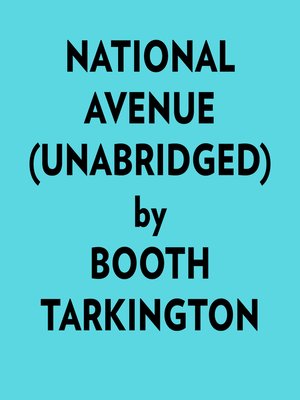
Sign up to save your library
With an OverDrive account, you can save your favorite libraries for at-a-glance information about availability. Find out more about OverDrive accounts.
Find this title in Libby, the library reading app by OverDrive.



Search for a digital library with this title
Title found at these libraries:
| Library Name | Distance |
|---|---|
| Loading... |
Please note: This audiobook has been created using AI voice. National Avenue, originally titled The Midlander, is Booth Tarkington's final entry in his Growth Trilogy. Like the previous entries in the series, National Avenue addresses the rapid industrialization of smalltown America at the turn of the century, and the socioeconomic changes that such change brings with it. Dan Oliphant and his brother Harlan are the children of a wealthy smalltown businessman. Harlan is a traditional upperclass man—affecting an accent, dressing for dinner, and contemplating beauty and culture—while Dan is boisterous and lively, eager to do big things. Dan sees the rise of industry in America's east as a harbinger for his own Midwestern town, and sets his mind on building an industrial suburb, Ornaby Addition, next to his city's downtown. Dan's idea is met with scorn and mockery from not only his family, but also his fellow townspeople. Dan persists nonetheless, and soon the town must contend with his dream becoming a reality: noisy cars, smoky factories, huge, unappealing buildings, and the destruction of nature and the environment become the new normal as Dan's industrial dream is realized. Where The Turmoil focuses on industrialization's effect on art and culture, and The Magnificent Ambersons focuses on industry's destruction of family and of smalltown life, National Avenue focuses on the men and women who actually bring that change about. Dan is portrayed sympathetically, but Tarkington makes it clear that his dreams and choices lead to a deeply unhappy family life and the ruination of the land around him. But can Dan really be faulted for his dream, or is industry inevitable, and inevitably destructive?







